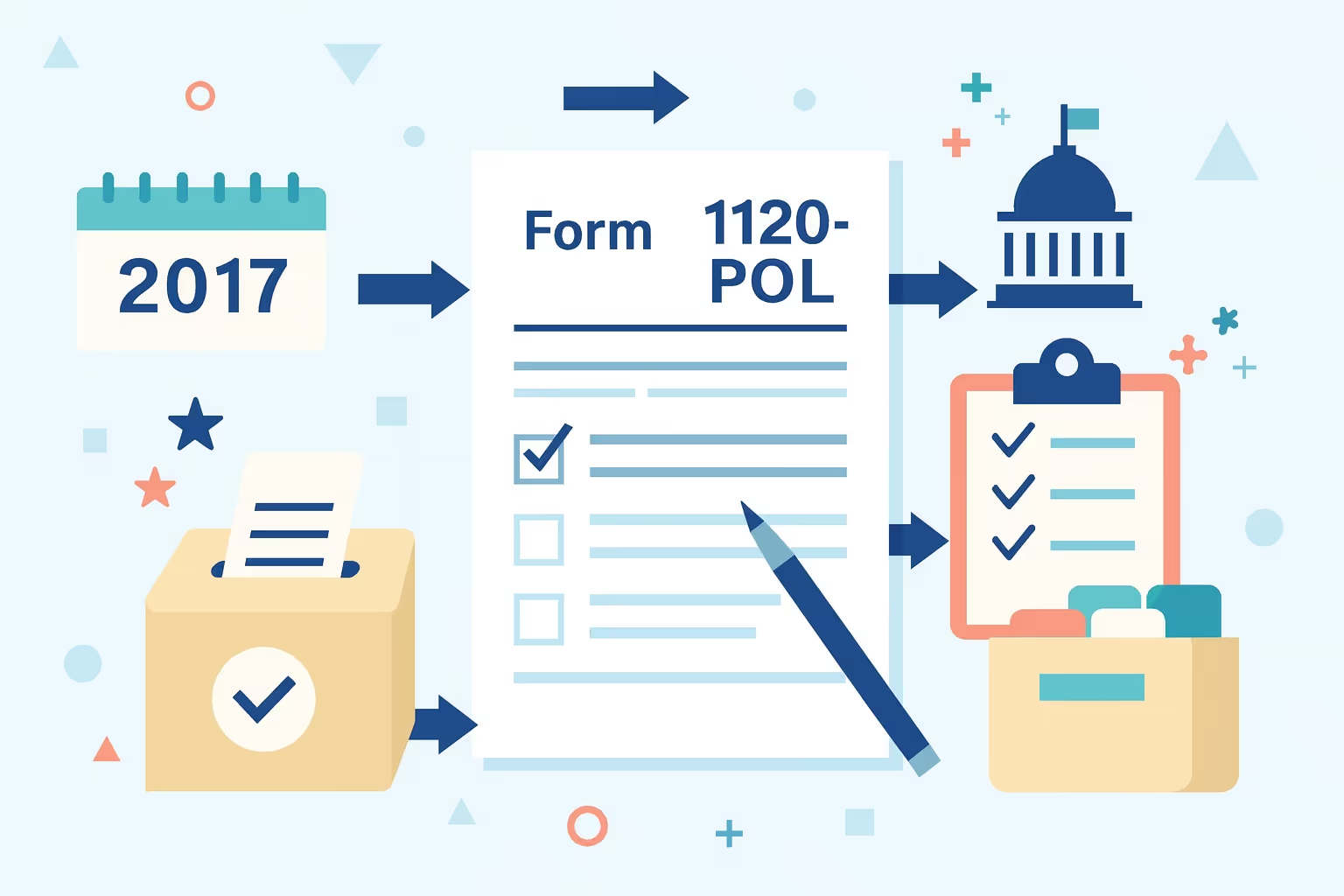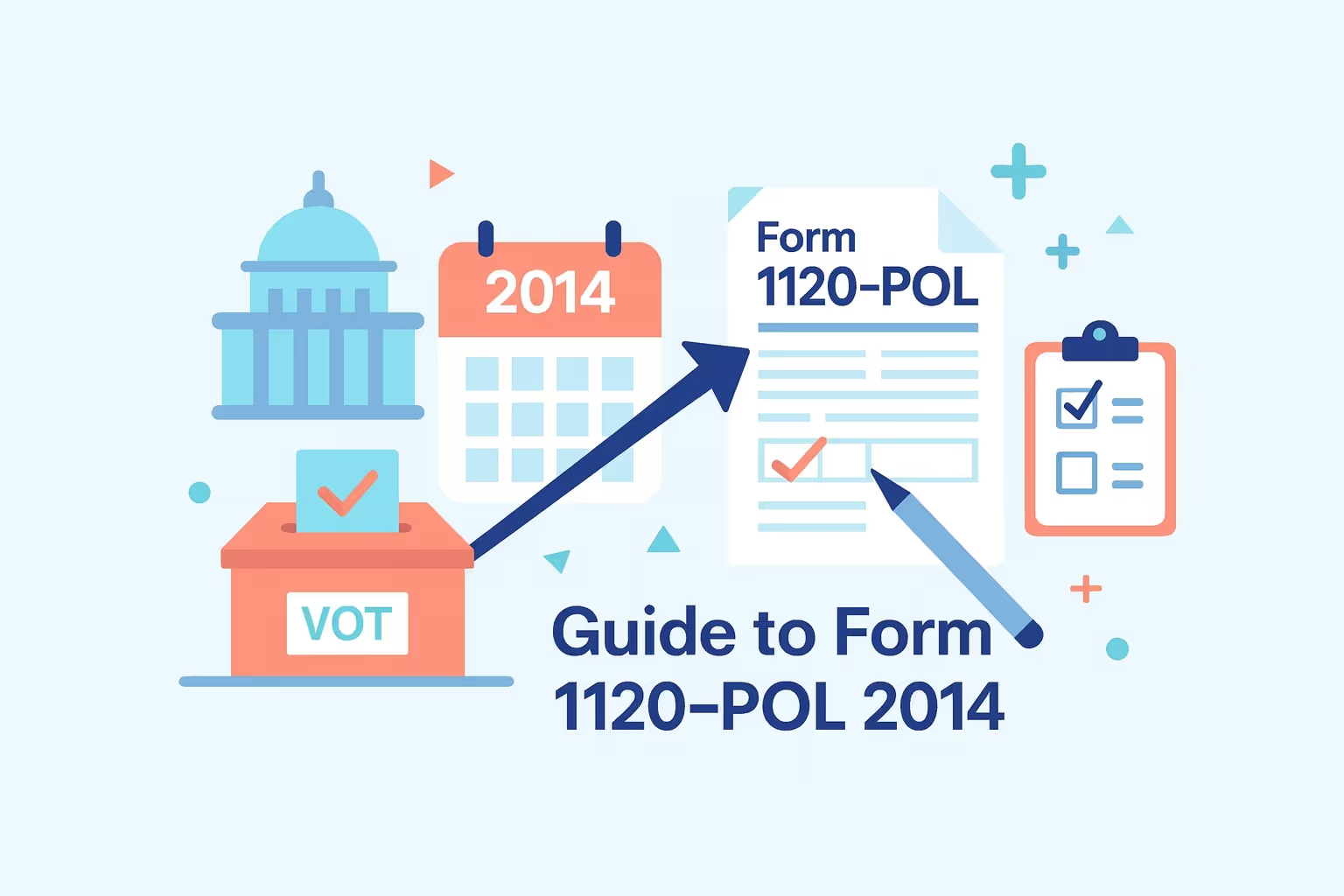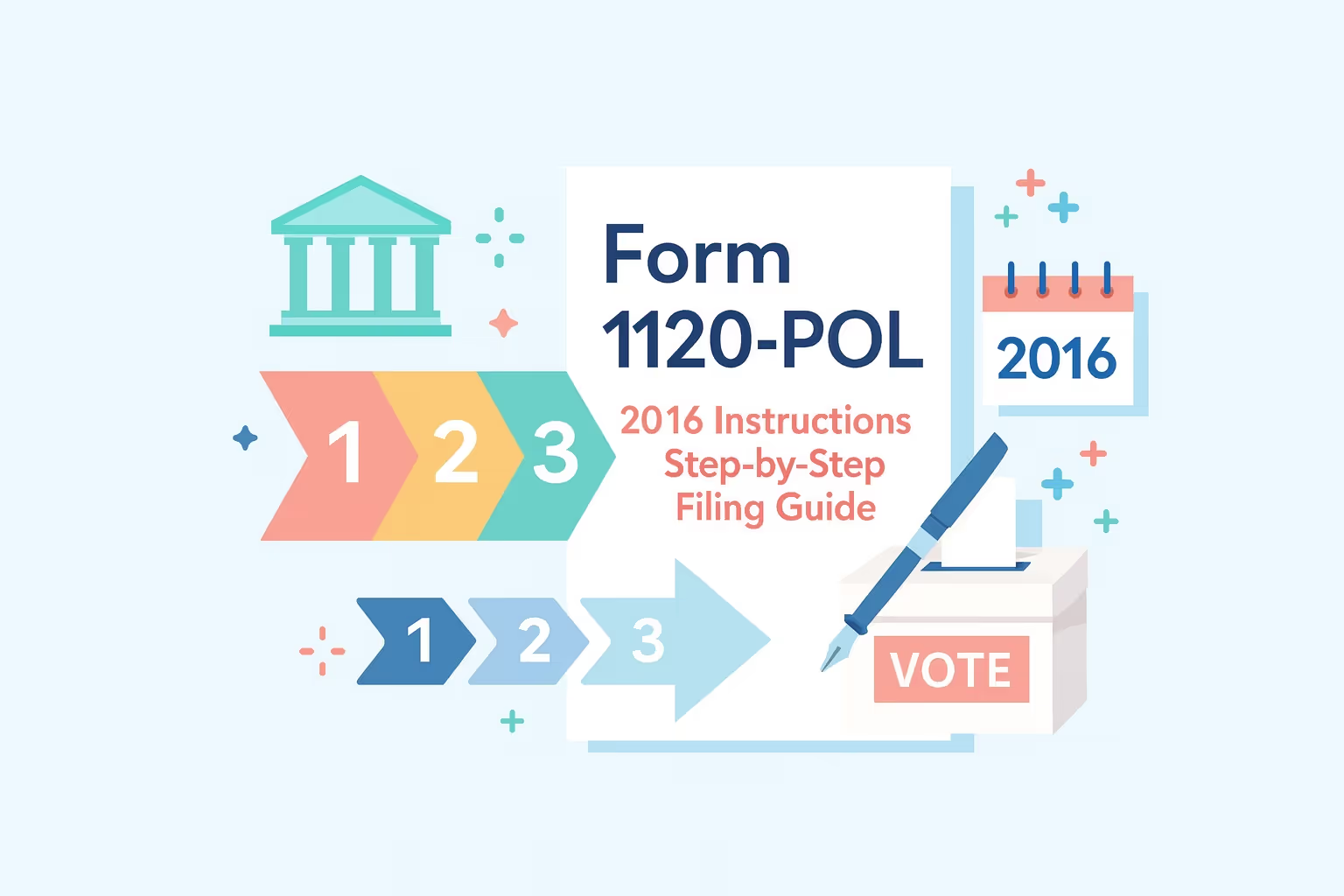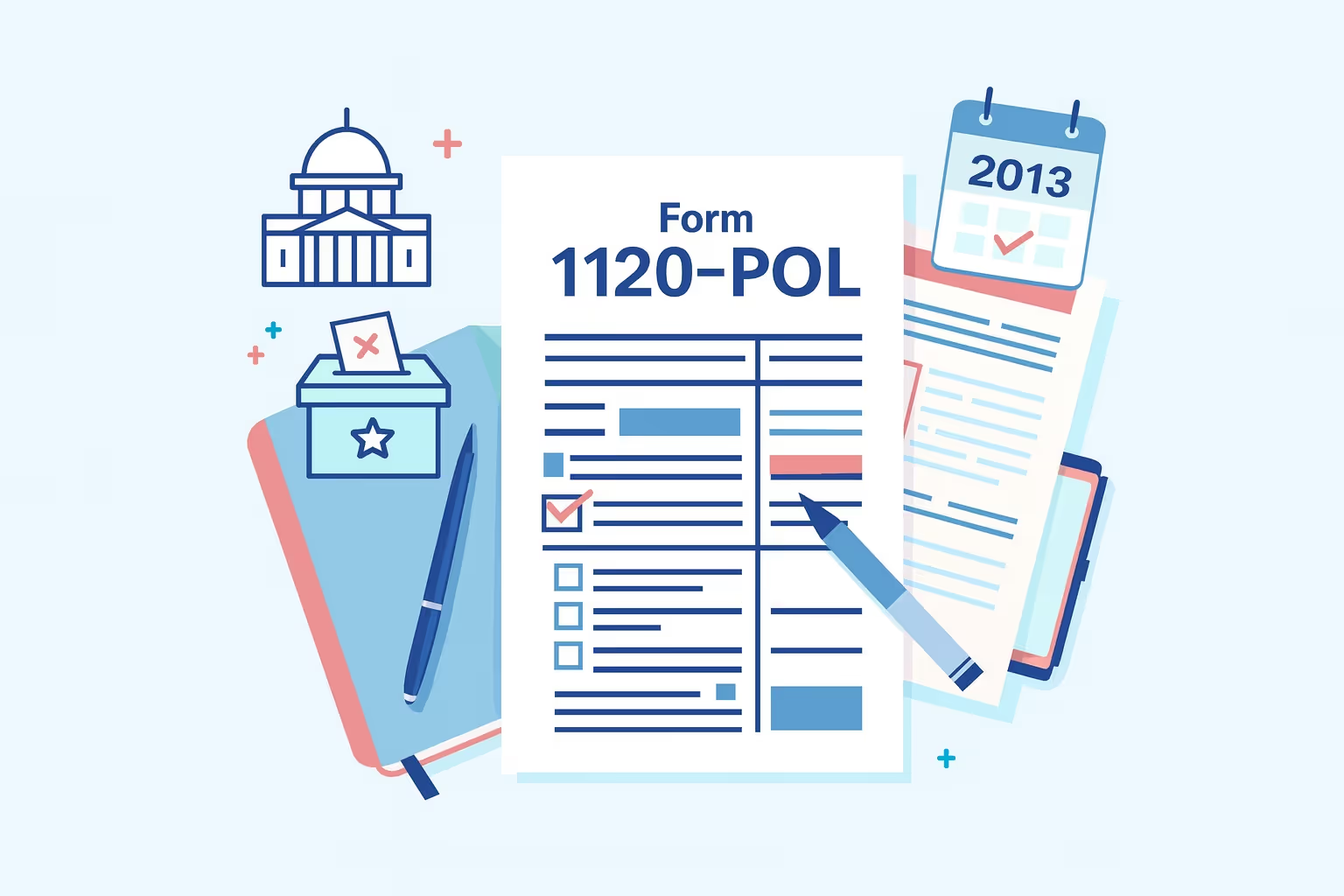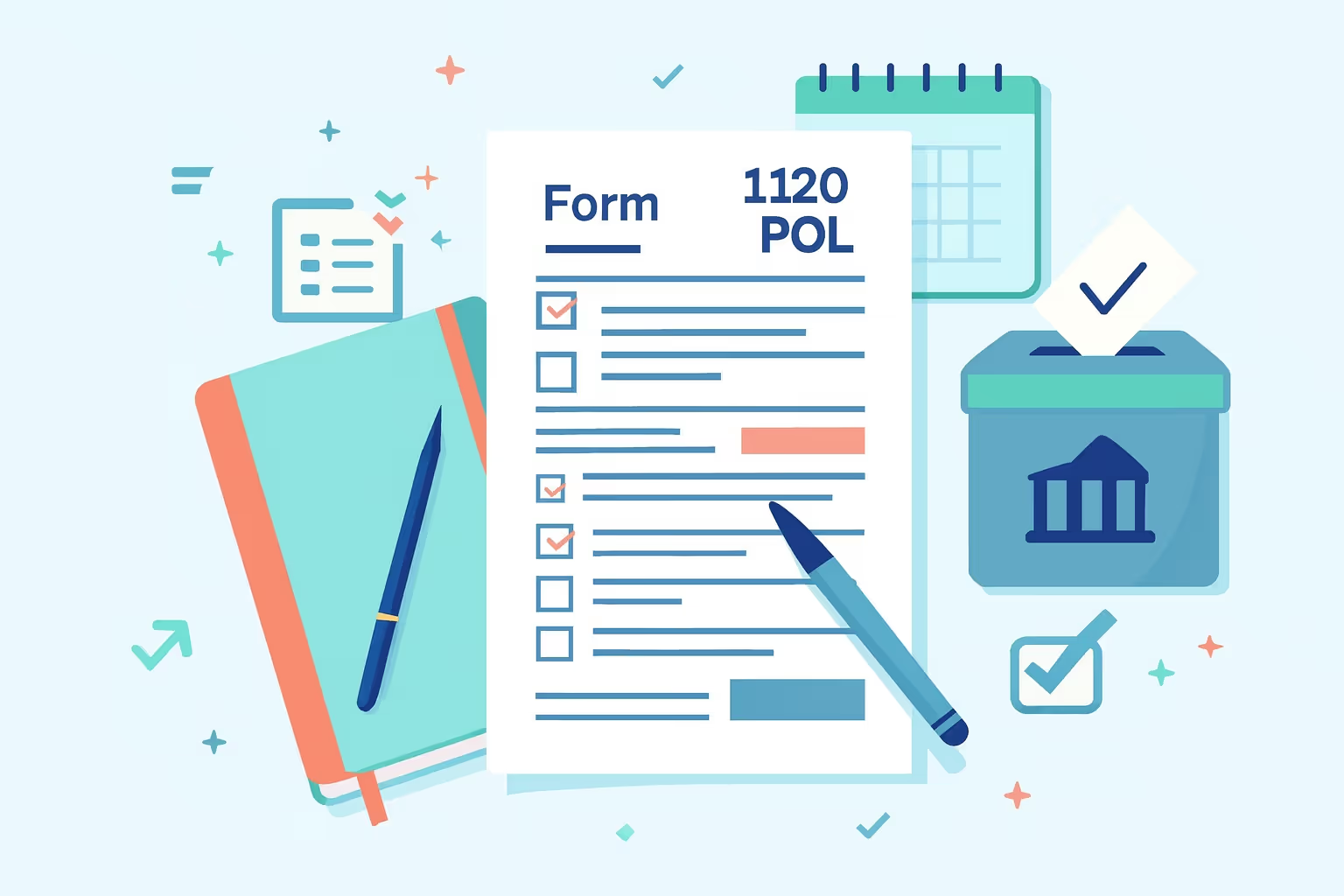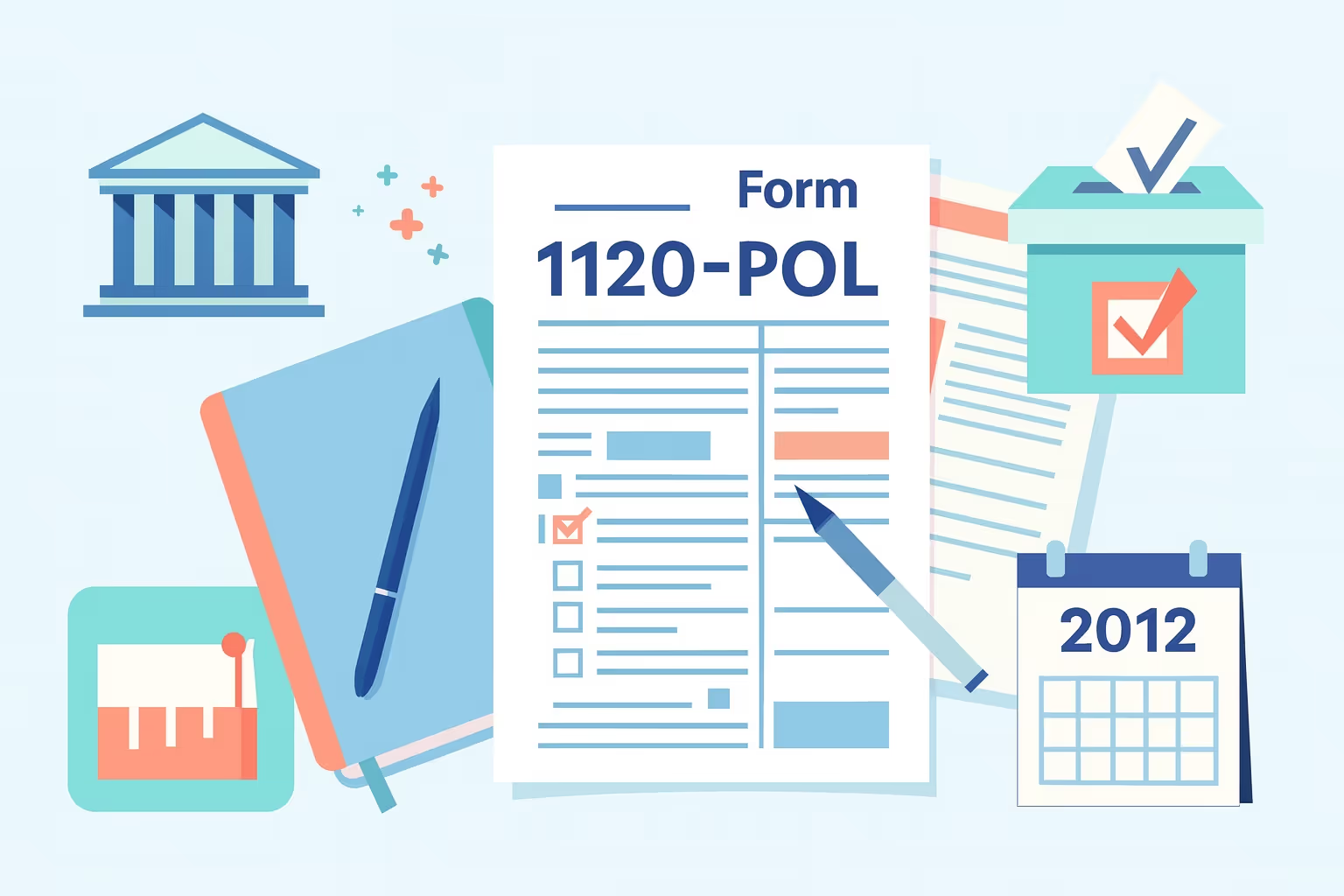
La presentación de impuestos federales puede resultar compleja para las organizaciones, especialmente cuando se trata de formularios especializados como el formulario 1120-POL. Este formulario, conocido oficialmente como declaración de impuestos sobre la renta de los EE. UU. para determinadas organizaciones políticas, se aplica a las entidades políticas que deben declarar sus ingresos imponibles y cumplir con requisitos federales específicos. Para el año tributario 2012, Servicio de Impuestos Internos (IRS) estableció reglas y plazos particulares que los comités políticos, los grupos de campaña y otras organizaciones debían cumplir. La comprensión de estos requisitos garantiza el cumplimiento y evita las sanciones que pueden derivarse de errores o de la falta de presentación de documentos.
Las instrucciones del formulario 1120-POL 2012 están diseñadas para ayudar a las organizaciones a navegar paso a paso por el proceso de presentación de informes. El formulario requiere una clasificación precisa de los ingresos imponibles, la documentación adecuada de las deducciones y su presentación oportuna al Departamento del Tesoro. Si bien los ingresos por funciones exentas, como las contribuciones, generalmente están excluidos de los impuestos, los ingresos por inversiones y algunos otros ingresos deben declararse. Tener una orientación clara facilita que las organizaciones determinen sus obligaciones y mantengan una buena reputación ante el IRS.
Las organizaciones políticas también deben conocer los requisitos relacionados, como el uso del Sistema Electrónico de Pago de Impuestos Federales para realizar los pagos. Los plazos, las inscripciones y el seguimiento del historial de pagos son partes fundamentales del cumplimiento. Muchos grupos confían en profesionales de impuestos, proveedores de nómina o agentes de servicio al cliente del IRS o del EFTPS para garantizar la finalización adecuada del proceso. Un enfoque estructurado de la presentación de impuestos, respaldado por instrucciones claras y precisas, ayuda a las organizaciones a cumplir de manera eficiente con sus responsabilidades federales.
¿Qué es el formulario 1120-POL?
El formulario 1120-POL, también conocido como declaración de impuestos sobre la renta de los Estados Unidos para ciertas organizaciones políticas, es el formulario federal que se utiliza para declarar los ingresos imponibles y calcular la obligación tributaria de las entidades políticas. El Servicio de Impuestos Internos exige que se presente este formulario cuando las organizaciones generan ingresos que no reúnen los requisitos para estar exentos en virtud de la ley tributaria.
¿Quién debe presentar el formulario 1120-POL?
El IRS exige una presentación cuando:
- Las organizaciones políticas reciben ingresos sujetos a impuestos. Esto incluye a los grupos organizados principalmente para influir en la selección, elección o nombramiento de funcionarios públicos.
- Se considera que las organizaciones exentas tienen ingresos imponibles en virtud de la sección 527 (f) (1). Por lo general, esto se aplica a los grupos que no son organizaciones políticas pero que participan en actividades políticas.
Ejemplos de organizaciones que presentan una solicitud
- Partidos políticos que aceptan contribuciones o realizan gastos
- Los comités de candidatos se organizan para elecciones específicas.
- Comités de acción política, incluidos los PAC y los Super PAC
- Comités de partidos y comités de campaña que apoyan a los candidatos
- Comités de gastos independientes que gastan fondos para influir en las elecciones
Características principales del formulario
- Debe presentarse anualmente si existen ingresos imponibles.
- Aplica una tasa impositiva basada en las normas federales para el año tributario 2012.
- A menudo se presenta junto con formularios de divulgación, como el formulario 8871 y el formulario 8872.
El formulario 1120-POL garantiza que las organizaciones políticas y los grupos relacionados cumplan con los requisitos del IRS al declarar los ingresos con precisión y cumplir con los plazos federales. Este proceso ayuda a mantener la transparencia y la presentación adecuada de informes tributarios dentro del sistema político.
Requisitos y plazos de presentación
Las organizaciones deben presentar el formulario 1120-POL cuando generan ingresos imponibles durante el año tributario. El IRS exige que los comités políticos, las organizaciones de campaña y los grupos exentos con actividades sujetas a impuestos presenten este formulario para garantizar el cumplimiento federal. La presentación adecuada ayuda a evitar multas y garantiza que las organizaciones cumplan con sus responsabilidades en virtud de las normas tributarias federales.
Para el año tributario 2012, la fecha límite para presentar la declaración fue el 15 de marzo de 2013. Si la fecha límite coincidía con un fin de semana o un feriado federal, la fecha límite se extendía hasta el siguiente día hábil. Las prórrogas estaban disponibles presentando el formulario 7004, que concedía hasta seis meses adicionales para presentar la declaración, pero los pagos de impuestos aún debían hacerse antes de la fecha de vencimiento original.
Los requisitos clave de presentación incluyen:
- La organización debe revisar los ingresos para determinar si existen ingresos imponibles.
- Se deben mantener registros de las actividades exentas y no exentas, incluidos los estados de cuenta bancarios y los recibos.
- Todas las presentaciones deben enviarse al Departamento del Tesoro de forma electrónica o por correo.
- El pago de los impuestos adeudados debe hacerse mediante el sistema electrónico de pago de impuestos federales u otro método aprobado.
Al cumplir con estos requisitos, las organizaciones pueden cumplir con las normas del IRS y evitar demoras o multas como resultado del incumplimiento de los plazos o de las presentaciones incompletas.
Ingresos y deducciones imponibles
Las organizaciones políticas deben distinguir cuidadosamente entre los ingresos imponibles y los ingresos por funciones exentos. Los ingresos imponibles incluyen los montos obtenidos por actividades que no están directamente vinculadas al propósito político de la organización. Los ingresos por funciones exentos incluyen las contribuciones y otros fondos recaudados para apoyar elecciones o campañas, que por lo general no están sujetos a impuestos federales.
Las fuentes de ingresos imponibles incluyen:
- Ingresos por inversiones, como intereses, dividendos y ganancias de capital
- Ingresos por alquiler de propiedades no relacionadas con funciones exentas
- Ingresos de actividades comerciales o empresariales no relacionadas
- Ingresos de propiedades financiadas con deuda
Las deducciones permitidas se limitan a los gastos directamente relacionados con los ingresos imponibles. Estas pueden incluir:
- Tarifas de inversión y administración de propiedades
- Servicios profesionales, como la preparación de impuestos y los costos contables
- Los gastos de oficina están directamente relacionados con las actividades imponibles.
- Comisiones bancarias vinculadas a cuentas de inversión
Los gastos no deducibles incluyen:
- Gastos de campañas políticas
- Costos de cabildeo y promoción
- Gastos relacionados únicamente con las actividades funcionales exentas
La aplicación correcta de estas categorías garantiza que los ingresos imponibles declarados en el formulario 1120-POL sean precisos y completos. Este enfoque cuidadoso permite a las organizaciones cumplir con los requisitos del IRS y, al mismo tiempo, maximizar las deducciones permitidas en virtud de la ley tributaria federal.
Instrucciones paso a paso para completar el formulario 1120-POL
Paso 1: Reunir información organizacional y financiera.
Antes de completar el formulario, la organización debe recopilar todos los registros esenciales. Esto garantiza la precisión y evita demoras. Los artículos incluyen:
- Número de identificación del empleador y nombre de la organización legal.
- Estados de cuenta bancarios, cheques cancelados y registros contables del año tributario.
- Documentación de los ingresos por funciones exentas, como las contribuciones y las cuotas de membresía.
- Registros de ingresos imponibles, incluidos intereses, dividendos, alquileres y ganancias de capital.
- Una copia de la declaración del año anterior y los detalles de los pagos o depósitos de impuestos estimados.
Paso 2: Complete la información del encabezado.
La sección superior del formulario requiere los detalles de identificación de la organización. El declarante debe:
- Ingresa el nombre legal completo y la dirección de la organización.
- Proporcione el número de identificación del empleador en el formato requerido.
- Indique las fechas de inicio y finalización del año tributario 2012.
- Confirme que se aplica el año tributario o el año fiscal correctos.
Paso 3: Reportar los ingresos.
El IRS exige que se informen todas las fuentes de ingresos imponibles. El formulario incluye categorías línea por línea:
- Reporte los ingresos por intereses de cuentas bancarias o bonos.
- Enumere los dividendos obtenidos de acciones o fondos mutuos.
- Introduzca los ingresos brutos de alquiler recibidos durante el año.
- Incluya las ventas brutas o los ingresos de actividades comerciales no relacionadas.
- Registre las ganancias de capital y otros tipos de ingresos.
Paso 4: Aplicar las deducciones.
Las deducciones reducen la renta imponible, pero deben estar directamente relacionadas con la producción de ingresos. Las deducciones estándar permitidas incluyen:
- Honorarios pagados por la administración de inversiones o la supervisión de la propiedad.
- Servicios profesionales como la preparación de impuestos o la contabilidad.
- Gastos administrativos y de oficina vinculados a actividades imponibles.
- Comisiones de servicios bancarios relacionadas con cuentas de inversión.
Paso 5: Calcular la obligación tributaria.
El IRS exige que las organizaciones políticas apliquen la tasa individual más alta vigente en 2012, que fue del 35 por ciento. El cálculo implica:
- Sumando todas las fuentes de ingresos imponibles.
- Restar las deducciones permitidas.
- Multiplique el resultado por 35 por ciento para determinar el impuesto adeudado.
Paso 6: Aplicar los pagos y determinar el saldo.
Una vez que se calcula la obligación tributaria, el declarante debe aplicar cualquier pago ya realizado. Esto incluye:
- Pagos de impuestos estimados presentados durante el año.
- Los sobrepagos de años anteriores se transfieren.
- Los pagos se realizan a través del sistema electrónico de pago de impuestos federales u otro método aprobado.
Paso 7: Complete y envíe la declaración.
El último paso garantiza que la devolución sea precisa y se envíe a tiempo. Las organizaciones deben:
- Revise todas las entradas para comprobar su precisión e integridad.
- Firme y feche el formulario por un oficial autorizado.
- Adjunte los cronogramas requeridos, como el Anexo D o el Anexo M-1, si corresponde.
- Presente electrónicamente o envíe por correo la declaración completa a la dirección correcta del IRS.
Seguir estos pasos permite a las organizaciones presentar sus declaraciones correctamente, evitar multas y cumplir con las normas del IRS para las organizaciones políticas.
Métodos de presentación y opciones de pago
Las organizaciones pueden elegir entre la presentación electrónica y la presentación en papel, pero el IRS fomenta la presentación electrónica porque mejora la precisión y acelera el procesamiento. La presentación electrónica también permite a los declarantes recibir una confirmación de que su declaración ha sido aceptada, lo que brinda a las organizaciones la tranquilidad de saber que han cumplido con sus obligaciones.
Presentación electrónica (E-File)
- La presentación electrónica ofrece comodidad porque las declaraciones se transmiten directamente al IRS.
- Los usuarios pueden iniciar sesión a través de un software aprobado para completar y transmitir electrónicamente el formulario.
- La autenticación multifactorial y un número de identificación personal suelen ser necesarios para la seguridad de la cuenta.
- Una vez que se envía la declaración, el declarante recibe notificaciones por correo electrónico confirmando el estado.
Archivado en papel
Algunas organizaciones siguen optando por archivar en papel, especialmente si no tienen acceso al software aprobado. Al usar este método:
- El formulario debe escribirse o completarse claramente con tinta negra.
- Se requiere la firma de un oficial autorizado.
- El formulario completo y los archivos adjuntos deben enviarse por correo a la dirección correcta del IRS proporcionada en las instrucciones.
- El uso del correo certificado permite a los contribuyentes rastrear la entrega y confirmar la recepción.
Opciones de pago
Los pagos de impuestos federales deben enviarse electrónicamente. Las opciones incluyen:
- El Sistema electrónico de pago de impuestos federales (EFTPS) requiere la inscripción, una contraseña y un inicio de sesión seguro.
- Direct Pay permite que los pagos se realicen desde una cuenta corriente o de ahorros.
- Proveedores de nómina que pueden gestionar los pagos en nombre de las organizaciones.
- Los agentes de servicio al cliente de EFTPS están disponibles para ayudarlo con los problemas de inscripción, inicio de sesión o contraseña.
El uso de métodos electrónicos de pago de impuestos federales garantiza que los pagos se procesen en días hábiles y que el historial de pagos se pueda revisar en línea. Esto brinda mayor seguridad y comodidad a los contribuyentes.
Cronogramas y anexos requeridos
El formulario 1120-POL a menudo requiere que se completen anexos y formularios adicionales con la presentación. Estos archivos adjuntos proporcionan al IRS detalles de respaldo y ayudan a conciliar los registros contables.
- El Anexo D debe archivarse si la organización reporta ganancias o pérdidas de capital. Cada transacción se debe informar por separado y se deben adjuntar los estados de cuenta del corredor.
- El Anexo M-1 es obligatorio para conciliar los ingresos contables con los ingresos tributarios. Los ajustes pueden incluir gastos políticos no deducibles o diferencias de depreciación.
- El formulario 8871 es obligatorio para las organizaciones políticas que buscan la exención de impuestos. Debe presentarse inmediatamente después de su establecimiento y actualizarse cuando se produzcan cambios.
- Se requiere el formulario 8872 para declarar las contribuciones y los gastos. Este formulario apoya la transparencia en el financiamiento político.
- Es posible que se requiera el formulario 8453-X cuando se presenta electrónicamente. Sirve como declaración que autoriza la transmisión de la declaración.
Incluir los archivos adjuntos adecuados garantiza que la declaración se considere completa y reduce el riesgo de correspondencia de seguimiento por parte del IRS.
Errores comunes que se deben evitar
Los errores en la presentación pueden provocar sanciones, retrasos en el procesamiento o auditorías innecesarias. Las organizaciones políticas deben ser conscientes de los errores frecuentes y tomar medidas para evitarlos.
- La clasificación errónea de las contribuciones como ingresos imponibles es un error estándar. Los ingresos por funciones exentas no deben declararse sujetos a impuestos.
- La deducción de los gastos no permitidos, como los costos de campaña o cabildeo, a menudo resulta en ajustes por parte del IRS.
- La presentación tardía o la falta de fecha de vencimiento pueden generar multas e intereses. Los contribuyentes deben planificar y solicitar prórrogas cuando sea necesario.
- La presentación de cheques en papel en lugar de utilizar el sistema electrónico de pago de impuestos federales requerido puede retrasar el procesamiento y provocar problemas de cumplimiento.
- No mantener la documentación adecuada, como los registros de ingresos y gastos, hace que sea difícil defender la exactitud de una declaración si se revisa.
Al comprender estas dificultades, las organizaciones pueden tomar medidas proactivas para garantizar una presentación precisa. Consultar a un profesional de impuestos o ponerse en contacto con el servicio de atención al cliente del IRS o del EFTPS puede ayudar a resolver las incertidumbres antes de presentar la declaración.
Situaciones especiales y personas que presentan su declaración por primera vez
No todas las organizaciones políticas tendrán las necesidades exactas de presentación. Algunos grupos llevan años sin ingresos sujetos a impuestos, mientras que otros pueden presentar el formulario 1120-POL por primera vez. El IRS brinda orientación para ambas circunstancias.
Años de inactividad o sin actividad
- Si la organización no tiene ingresos imponibles para el año, es posible que no se requiera el formulario 1120-POL.
- El formulario 8871 aún debe presentarse para mantener el estado de exención, incluso en los años en que no se realicen transacciones.
- Las organizaciones que reciben contribuciones o realizan gastos deben presentar el formulario 8872, independientemente de su nivel de actividad.
- Mantener registros precisos es esencial, incluso cuando no se adeuda ningún pago de impuestos federales.
Declarantes por primera vez
- Las organizaciones nuevas deben obtener un número de identificación del empleador (EIN) antes de completar el formulario.
- Los líderes deben confirmar si el grupo califica como organización política según las reglas de la sección 527.
- El establecimiento temprano de sistemas de contabilidad permite llevar un registro preciso tanto de los ingresos por funciones exentas como de los ingresos imponibles.
- Los contribuyentes pueden beneficiarse de trabajar con un profesional de impuestos o un proveedor de nómina para garantizar el cumplimiento adecuado de los requisitos de presentación.
Las personas que declaran por primera vez a menudo se enfrentan a dificultades para comprender las fechas de vencimiento, los métodos de pago y el sistema electrónico de pago de impuestos federales. Dedicar tiempo a inscribirse en el EFTPS, crear un inicio de sesión seguro y revisar el historial de pagos puede evitar problemas más adelante.
Preguntas frecuentes
¿Cuáles son las instrucciones del formulario 1120-POL 2012?
Las instrucciones del formulario 1120-POL 2012 explican cómo las organizaciones políticas deben presentar su declaración de impuestos federales. El formulario se usa para declarar los ingresos imponibles, aplicar deducciones y calcular el impuesto adeudado al Departamento del Tesoro. Las organizaciones deben seguir las normas del IRS, completar las secciones requeridas y presentar la declaración electrónicamente o por correo. Consultar a un profesional de impuestos puede ayudar a garantizar que el formulario se prepare correctamente y se envíe a tiempo.
¿Cómo se hacen los pagos de impuestos federales para este formulario?
Los pagos de impuestos federales deben hacerse electrónicamente a través del sistema de pago de impuestos federales. La mayoría de las organizaciones utilizan el Sistema electrónico de pago de impuestos federales (EFTPS), que requiere la inscripción, un número de identificación personal y un inicio de sesión seguro con autenticación multifactorial. El pago directo es otra opción disponible para ciertos contribuyentes. Los pagos se procesan dentro de los días hábiles y se envían notificaciones por correo electrónico para confirmarlos. Los agentes de servicio al cliente de EFTPS pueden ayudarlo con los problemas de inscripción o de cuenta.
¿Puede un proveedor de nóminas o un profesional de impuestos realizar pagos en nombre de las organizaciones?
Sí, un proveedor de nómina o un profesional de impuestos puede encargarse de las responsabilidades de pago de impuestos en nombre de las organizaciones políticas. Este proceso suele beneficiar a las organizaciones que prefieren la comodidad y la precisión. El proveedor o el representante deben tener los números de identificación fiscal y la autorización adecuados para completar la presentación. Los pagos se envían electrónicamente y el sistema del IRS mantiene un registro del historial de pagos. Este enfoque permite a las organizaciones centrarse en sus operaciones y, al mismo tiempo, garantizar que los impuestos federales se paguen de manera precisa y puntual.
¿Qué sucede si no se cumple la fecha límite?
Si una organización no cumple con la fecha límite para la presentación o el pago, se pueden aplicar multas e intereses. Por lo general, el IRS calcula un porcentaje del impuesto pendiente de pago por cada mes en que la declaración se retrase, hasta un límite máximo. Las organizaciones pueden solicitar una prórroga por adelantado mediante el formulario 7004, pero esto solo extiende la fecha límite de presentación, no la fecha límite de pago. Realizar los pagos a tiempo a través de EFTPS o Direct Pay evita las multas y mantiene la cuenta al día.
¿Cómo pueden las organizaciones inscribirse en el Sistema electrónico de pago de impuestos federales?
La inscripción en el Sistema Electrónico de Pago de Impuestos Federales requiere la creación de una cuenta en el Servicio Fiscal. Las organizaciones deben proporcionar detalles como el número de identificación del contribuyente, la dirección comercial y la información bancaria. Después de la inscripción, el IRS envía por correo un número de identificación personal para un acceso seguro. Los usuarios deben crear una contraseña e iniciar sesión a través del sitio del EFTPS. Una vez completado el proceso, los pagos se pueden programar, revisar y rastrear, lo que brinda a las organizaciones un control preciso sobre su historial de pagos.












